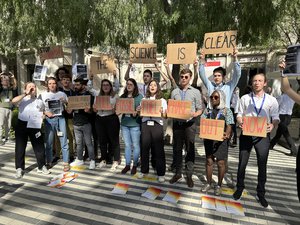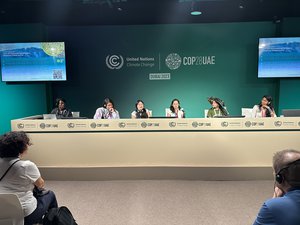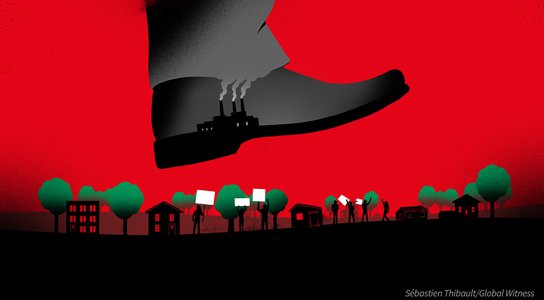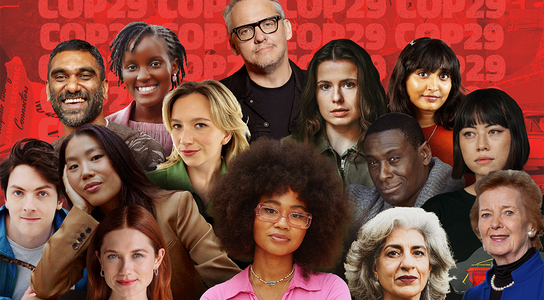The 28th UN climate summit leaves us, for the first time, with an agreement to transition away from fossil fuels. Yet the failure to agree a phase-out ignores the science and sends a signal to polluters that governments may tolerate fossil fuels forever, even as millions of people around the world demand climate action now.
COP28 in Dubai is finally over, and despite urgent warnings from scientists and growing demands from millions of people, the much-needed promise to “phase out” fossil fuels didn’t make it into the agreement.
This year was the first "Global Stocktake (GST)” – a report examining countries’ efforts to reduce planet-warming emissions since the Paris Agreement was signed in 2015. In essence, it’s a global “report card” providing governments with guidance on where they need to improve.
The results are in, and it’s a pretty poor D+.
Here’s our take on what countries negotiated and agreed – and where deals fall short.

Fossil fuels
Governments have finally agreed, after 28 attempts, the bare minimum that we’ve known for decades – we must reduce fossil fuel use. At a COP run by petrostates and flooded by thousands of oil and gas lobbyists (2,456 lobbyists to be exact), that simple acknowledgment is a hard-won victory for activists and defenders who everyday are fighting the interests of big polluters.
But we should be realistic about what the failure to agree a phase-out means: fossil fuels forever. This agreement sends a signal to those thousands of lobbyists who gathered at COP – there is a long and profitable future for their destructive businesses, regardless of what the science tells us.
Serious climate action means no loopholes, no reliance on unproven technology and an immediate phaseout, with massive financial support for the transition from the richest countries and from big polluters.

Defenders and human rights
The final text slashed a lot of language on human rights and justice, with pitiful wording merely "encouraging" parties to "fully respect" human rights – failing to recognise that these rights are fundamental existing obligations that governments must implement. People must be at the heart of climate solutions.
Since the Paris Agreement was signed in 2015, we documented the killings of at least 1,390 land and environmental defenders and our investigations have exposed the role of authoritarian governments and abusive corporate actors who continue to silence, harass and exclude Indigenous and rural communities, environmental lawyers, scientists, journalists, youth activists, and other key actors central to solving the climate crisis.
In the run-up to COP, we joined 150 organisations to call on the UNFCCC to recognise and protect Defenders. And yet, there is not a single reference to land and environmental defenders in the final text.
The reality on the ground was no different. Protests were tightly controlled and the designated locations for public actions were closed down – despite being labelled the ‘most inclusive’ COP, registered Indigenous groups were still outnumbered by those affiliated with oil and gas .
Brazilian activist and Indigenous rights campaigner Neidinha Suruí said:
“It does not matter how loud we are in the outside, claiming for access, those who hold the pen are never defenders”
Forests
The final text acknowledged the need for enhanced efforts to halt and reverse deforestation by 2030. And yet, a group of 145 world leaders had agreed on the same target at COP26. Global deforestation rates increased last year.
These agreements do put forests at the heart of climate negotiations – although it remains disturbing that world leaders have ignored the more urgent 2025 global target to end commodity-driven deforestation.
The UAE's "flagship" declaration on net-zero food systems also lacked any mention of deforestation, despite agricultural clearance driving over 90% of tropical forest loss.
And fossil fuel lobbyists were not the only ones flooding the COP venue - agribusiness lobbyists also flocked to Dubai in record numbers. Their industry-led zero deforestation schemes are no longer an effective smokescreen.
JBS – the world’s largest meat company – reportedly sent 11 people to Dubai. Our data shows that every $1,000 invested in the company since 2010 has resulted in around one soccer field of forest destruction in Brazil linked to its supply chain. Their mission was to tell their “story” about climate science.

Strategic minerals and the transition to ‘clean’ energy
COP28 opened with calls for a ’just energy transition’ and pledges to rapidly increase the capacity of renewable energy technologies. Demand for transition minerals – the minerals that will fuel a clean energy transition – is set to explode. According to the International Energy Association, from 2017 to 2022, demand for lithium tripled, there was a 70% jump in demand for cobalt, and a 40% rise in demand for nickel.
Early on at the summit, in an address to country leaders, UN Secretary-General António Guterres announced his plan to set up a Panel on Critical Energy Transition Minerals which will bring together governments, international organisations, industry, and civil society to develop common and voluntary principles to guide extractive industries “in the name of justice and sustainability”.
The panel is a positive step towards a transition from fossil fuels towards renewable energy that is just, sustainable and benefits all countries. But words must become actions.
The final text references commitments to “tripling renewable energy capacity globally and doubling the global average annual rate of energy efficiency improvements by 2030”. References to a ‘just transition’, ‘sustainable development’ and ‘for more meaningful participation of all people’ – including Indigenous peoples, impacted communities and women– are encouraging, yet there wasn’t a single commitment to mitigate the destructive impact of extracting minerals on affected communities.
As nation states scramble to secure supplies of minerals to power their clean energy transitions, we need to see concrete actions from our leaders to clean up mineral supply chains and ensure that the renewable energy transition doesn’t come at the expense of people and the planet .
What’s next?
The Global Stocktake made it clear: countries are not on track to prevent 1.5C of warming. The summit produced no concrete recommendations on fossil fuels, signalling to the thousands of fossil fuel industry lobbyists present that their interests will prioritised over those suffering the worst effects of the climate crisis. Choosing Azerbaijan – another petrostate – as the host for COP29 will do little to encourage the climate action we need.
Change is possible – but only if we dismantle the power and influence polluting industries have over our climate negotiations, and instead clear a seat at the table for those on the frontlines of the climate crisis.


